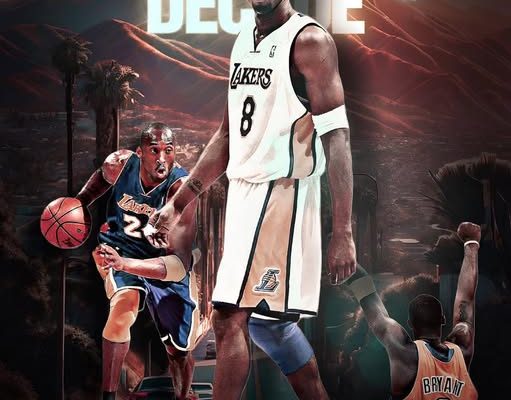The 2000s was a decade defined by many great basketball players, but none left a mark quite like Kobe Bryant. Often discussed in the GOAT (Greatest of All Time) debate, Kobe’s reign during this era is unmatched, combining relentless work ethic, unparalleled scoring ability, and a collection of championships and records that solidify his legacy as one of basketball’s all-time greats. To understand why the 2000s belong to Kobe Bryant, one must look beyond just his statistics and trophies and appreciate the cultural, competitive, and personal impact he had on the NBA and basketball worldwide.
Kobe Bryant entered the 2000s riding the momentum of a promising start to his NBA career. Drafted in 1996 straight out of high school, Kobe quickly evolved from a precocious teenager with immense potential to a bona fide superstar. However, it was in the 2000s that Kobe truly became a basketball icon. The decade opened with the Los Angeles Lakers, led by the dynamic duo of Kobe Bryant and Shaquille O’Neal, embarking on a mission to reclaim NBA supremacy. Between 2000 and 2002, the Lakers captured a historic three-peat, sweeping through the playoffs with a mix of dominance, tenacity, and sheer willpower. Kobe was an integral part of these championship runs, combining his fearless scoring mentality with clutch performances that often left opponents in awe.
Those Lakers teams were marked by their ability to thrive under pressure, with Kobe consistently rising to the occasion. His footwork, mid-range shooting, and ability to create his own shot became defining traits, establishing him as one of the most versatile and dangerous offensive weapons in the league. Kobe’s Mamba Mentality, a mindset that embraced relentless training, unwavering focus, and an obsession with excellence, began to capture the imagination of fans and aspiring athletes alike. This ethos was not just about physical prowess but also mental toughness — a willingness to push through pain, adversity, and criticism to achieve greatness.
After the 2002 championship, the Lakers experienced turbulence as the Shaq-Kobe partnership deteriorated. Yet, rather than diminish Kobe’s stature, this era served as a testament to his individual brilliance. Without Shaquille O’Neal, Kobe transformed into the Lakers’ undisputed leader and offensive centerpiece. The 2000s saw Bryant develop into an even more prolific scorer, culminating in his legendary 81-point game against the Toronto Raptors in 2006 — the second-highest single-game scoring output in NBA history. This performance alone underscored Kobe’s unique scoring prowess, showcasing his ability to combine technical skill, athleticism, and sheer determination on a night when everything seemed to align perfectly.
Throughout the decade, Kobe continued to amass an impressive array of achievements. He was a perennial All-Star, multiple-time All-NBA First Team selection, and an All-Defensive team stalwart, highlighting his two-way impact on the game. His scoring titles in the mid-2000s further reinforced his dominance, as he outpaced other elite scorers in an era crowded with talent. Yet, beyond individual accolades, it was Kobe’s capacity to win that distinguished him. After Shaq’s departure, Kobe led the Lakers back to championship glory in 2009 and 2010, capturing two more NBA titles in epic Finals battles, including a thrilling seven-game series against the Boston Celtics in 2010. These championships were the product of Kobe’s evolution from a talented scorer to a mature, clutch leader capable of carrying his team through the toughest moments.
Kobe’s 2000s dominance was not confined to just his team’s success or his scoring feats; it was also reflected in the records he set and the milestones he reached. He became the youngest player in NBA history to reach 30,000 career points, a testament to his early start and sustained excellence. By the end of the decade, Kobe had solidified himself among the top scorers in league history, rivaling legends such as Michael Jordan and Wilt Chamberlain. His work ethic was famously intense, with stories of Kobe’s grueling training sessions and tireless preparation becoming almost mythical in NBA circles. This dedication not only improved his own game but raised the bar for the entire league, influencing a new generation of players who sought to emulate his relentless drive.
In addition to his scoring and championships, Kobe’s defensive tenacity often goes overlooked when discussing his greatness in the 2000s. He was named to the NBA All-Defensive First Team multiple times during the decade, showcasing his ability to guard the league’s best players and contribute significantly on the defensive end. This two-way excellence made Kobe a complete player, one who could dominate the game on both sides of the ball, a rarity among elite scorers. His footwork, anticipation, and competitive fire made him a nightmare matchup and a cornerstone for the Lakers’ defensive schemes.
Kobe’s impact transcended statistics and trophies. He became a global ambassador for the game, helping to popularize basketball worldwide. His flair, charisma, and signature moves — such as the fadeaway jumper and the unstoppable spin moves — captivated fans across continents. Kobe was also known for his fearless mentality in clutch situations, earning him the nickname “Black Mamba.” This alter ego embodied his killer instinct, the cold-blooded focus he exhibited in moments when the stakes were highest. Whether it was hitting a game-winning shot or delivering a critical defensive stop, Kobe’s presence was always felt in the most intense moments of the game.
The 2000s also witnessed Kobe’s evolution as a leader and mentor. As the decade wore on, he took younger players under his wing and embraced the responsibility of guiding the Lakers through various roster changes and challenges. His leadership style was intense and demanding, yet it forged a culture of accountability and excellence within the team. Kobe’s legacy from the 2000s is reflected not only in championships but also in the standard he set for professionalism, competitiveness, and preparation.
Kobe’s story in the 2000s is not without controversy or criticism. The decade included moments of personal and professional challenges, from conflicts within the Lakers organization to off-court issues that temporarily clouded his reputation. However, what sets Kobe apart is his ability to rise above adversity and reinvent himself. Each challenge seemed to fuel his fire rather than diminish it, resulting in some of the most memorable and inspiring chapters of his career. His resilience, combined with a relentless pursuit of greatness, became a defining characteristic of his decade-long dominance.
As the decade drew to a close, Kobe Bryant had firmly established himself as one of the greatest players the NBA has ever seen. His five NBA championships during the 2000s, combined with scoring records, defensive accolades, and a reputation for clutch performances, built a case for him as the GOAT of that era. The 2000s were Kobe’s decade — a time when he transcended the game and became a symbol of what it means to be a champion.
In hindsight, Kobe’s dominance in the 2000s laid the groundwork for the next generation of NBA superstars. Players like LeBron James, Kevin Durant, and Stephen Curry would rise in the following decade, but Kobe’s influence on their careers and on basketball culture remains undeniable. His Mamba Mentality has become a mantra for aspiring athletes around the world, encapsulating the essence of dedication, resilience, and the relentless pursuit of excellence.
Kobe Bryant’s legacy in the 2000s is one of unmatched championships, record-breaking scoring, and a competitive spirit that redefined greatness in the NBA. He was a player who brought artistry to the game, blending skill and athleticism with a mindset that refused to settle for anything less than perfection. To call Kobe the GOAT of the 2000s is to recognize a decade shaped by his brilliance, leadership, and unyielding drive — qualities that continue to inspire long after the final buzzer has sounded. The decade belonged to Kobe Bryant, and his impact will forever echo through the halls of basketball history.



